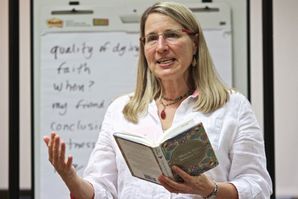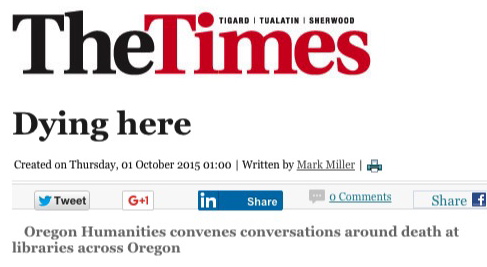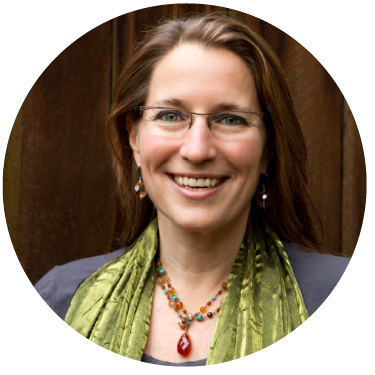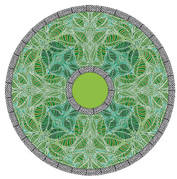 The Times photo by Jaime Valdez
The Times photo by Jaime Valdez I'm one of a team of facilitators recruited by Oregon Humanities for their new statewide conversation program, called "Talking About Dying." My first gig drew more than 30 folks for a wide-ranging discussion at Multnomah County's historic Central Library. I didn't know what to expect at the smaller town venue. When it looked like the two members of the media who'd shown up might be a good third of those in the room, I encouraged them to participate (personal engagement in the discussion is a request I've made of every reporter wanting to cover Death Cafe).
They declined. Nevertheless, the coverage they provided advanced the idea with others. My facilitation colleague Jenny Sasser led the session that followed this publication of this article - over 30 people showed up to talk about dying. I look forward to meeting folks in Tigard on November 17th and in Canby on January 12th.
Check out the fantastic resource list put together by Oregon Humanities with facilitators' input!
But Oregon Humanities, formerly known as the Oregon Council for the Humanities, is challenging the stigma around death and dying by encouraging people to come together and discuss it.
“Talking About Dying” is a series of 90-minute conversations being held at libraries throughout the state. One of them will be held at Cedar Mill Community Library on Tuesday evening.
Holly Pruett, a celebrant who is one of Oregon Humanities' event facilitators, acknowledged the difficulty of the subject as she began a recent Talking About Dying discussion at the Sherwood Public Library last week.
“It's not everybody who wants to walk into a room, saying, 'Yeah. Let's talk about dying,'” Pruett said.
The purpose of the conversations is not to figure out “the right way to die” or come to a consensus about death, what it means or how it should be approached, Pruett cautioned.
“Really, (Oregon Humanities') mission is to bring Oregonians together across differences to consider challenging questions, such as how we die,” she said.
The conversation at Sherwood drew a small group of about half a dozen people. At one point, Pruett noted that if there were a larger attendance, she would have encouraged people to pair off to share their thoughts and experiences around death and dying. Instead, they spoke directly to Pruett and the rest of the group.
One man talked about how living through — and surviving — stomach cancer had changed the way he thinks about dying.
“I had a good long time to think about something that really hadn't been part of my life before,” he said.
Another woman said she had just turned 70 earlier this year. As she ages and as she interacts with people at a hospice where she volunteers, she said she finds herself thinking more about how much time she has left, what arrangements she needs to make and what her experience of dying will be like.
“I guess I'd like to go through it with grace,” she said. “Maybe accepting the reality of a horrible diagnosis … accepting it, not fighting it.”
And another woman talked about a friend who is terminally ill; he has made it his goal as he dies to teach and encourage his loved ones not to be afraid of the end.
“He said that it has been really one of the great experiences of his life, because of all of these things he's learning, and the outpouring of love,” she said. “But it's hard for everybody else, of course.”
Pruett suggested that the awareness of death can enhance the appreciation of life.
“In that regard, death is really the great underwriter of life,” she said. “Death can make our lives richer. It can also be devastating in other regards, too.”
Participants in the Sherwood discussion described the experience of Talking About Dying as “interesting,” “stimulating,” “powerful” and “thought-provoking.”
“I guess the thing that has struck me tonight is that we're in a room with a bunch of people that I feel like have kind of a healthy attitude about death and dying, but it's a little distressing how many people you run into out in the world that are just so afraid of it, so unwilling to face it or do anything to prepare for it,” said one. “And it's hard to know what to say, or if you should say anything.”
For those who want to say something, or hear others express their thoughts about death and dying, the upcoming conversation at Cedar Mill Library will be held at 6:30 p.m. Tuesday.
The discussion will be facilitated by Jenny Sasser, director of the gerontology program at Marylhurst University.
"This is a reflection of Oregon Humanities' mission, which is to both facilitate opportunities across the state and to have conversations … about big questions," Sasser explained. "I can't think of a bigger question than how we face our own and others' end.”
The discussion is geared toward adults.
Although Sasser's background is in gerontology, which is the study of aging, she noted, "Aging and dying are not the same thing." Sasser added, "The questions of mortality are questions you might want to be asking — in different ways, but nonetheless asking — throughout our life course.”
Other opportunities to participate in Talking About Dying in the greater Portland area will be coming up on Oct. 15 in Sandy, Oct. 22 in Oregon City, Nov. 5 in St. Helens and Nov. 17 in Tigard. There will also be two events in January in Canby and Beaverton.





 RSS Feed
RSS Feed